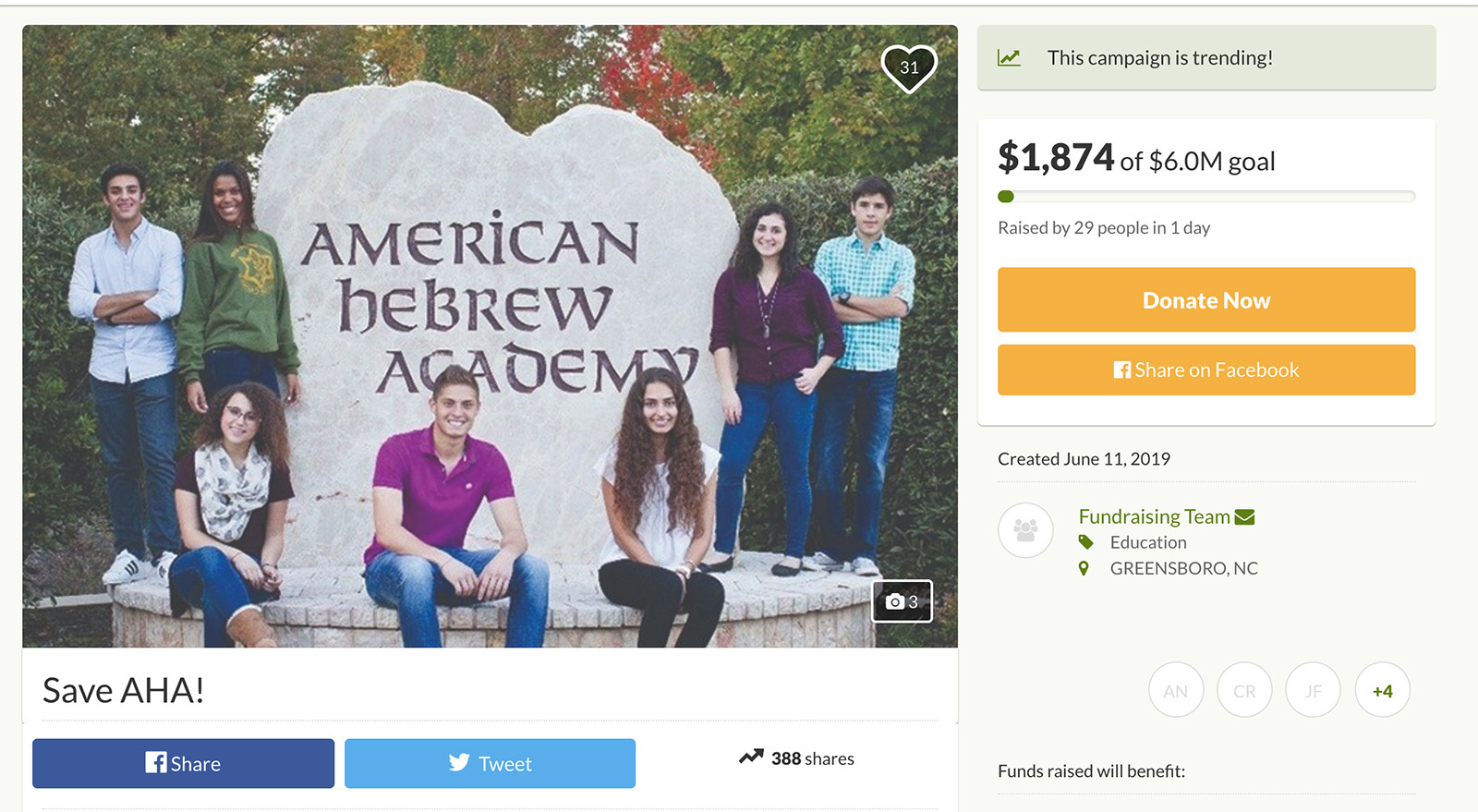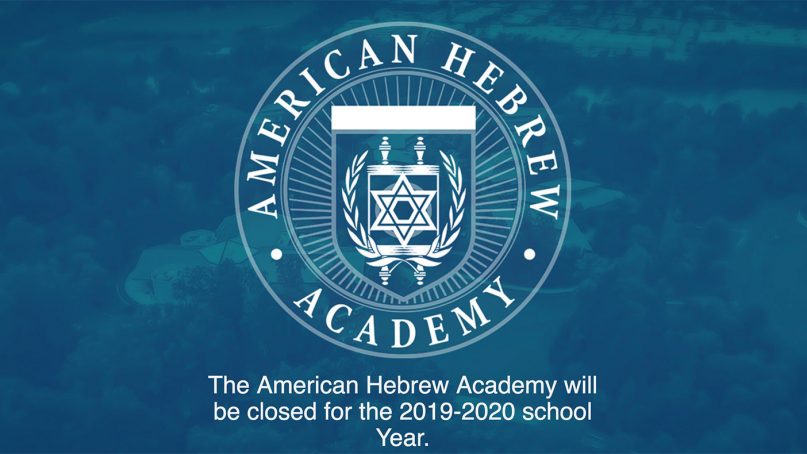(RNS) — News that the American Jewish Academy was closing sent shock waves through the nation’s Jewish community this week. Not only did the decision send students and teachers scrambling for alternatives, but it signaled the end as well of the country’s experiment with non-Orthodox Jewish boarding schools.
The terse message from the school’s CEO and board chair landed in email boxes at 10:50 a.m. on Tuesday (June 11), with the subject line “End of the Academy Era.”
According to the email, the school’s end was effective immediately.
“Due to insufficient growth in enrollment and our inability to secure adequate funding to cover future school expenses, the American Hebrew Academy is regretfully announcing that classes for the 2019-2020 academic year have been canceled,” the email read.
But in its 18-year history, the school, located on a verdant, 100-acre campus in Greensboro, N.C., was always an outlier.
“They were a unique institution in that they were trying to have a Jewish day school model combined with a boarding school,” said Rabbi Mitchel Malkus, head of school at the Charles E. Smith Jewish Day School in Washington, D.C. “That may be a challenge, especially in a community that values families staying together.”
The school opened on Sept. 10, 2001, thanks to an estimated $100 million donation from businessman and philanthropist Maurice “Chico” Sabbah. It included an $11.6 million athletic center and pool as well as dorms and residences for teachers and administrators, built with Jerusalem-like limestone facades.
The school catered to all Jewish families, from modern Orthodox to Reform. The academics were rigorous, with secular subjects as well as a range of classes on Jewish themes such as Hebrew, Talmud, Jewish philosophy and Holocaust studies. Graduates had their pick of colleges and universities.
But Sabbah, who had pledged millions more toward the running of the school, got entangled in a billion-dollar fraud suit with his company Fortress Re, after the events of Sept. 11, 2001. The company was in the reinsurance business — and managed a risk pool for several Japanese insurance companies that had insured the planes involved in the attack, according to published reports. Fortress Re was not able to cover their losses and eventually agreed to a $400 million settlement, according to The News & Record.
Sabbah died in 2006.
During the 2016-17 school year, the academy had $5 million in revenue and $18 million in expenses — a $13 million loss, according to its tax filing. Previous financial disclosures showed seven-figure annual deficits dating back at least a decade.
Glenn Drew, the school’s CEO and Sabbah’s nephew, declined to be interviewed.
But while many Jewish schools are facing financial challenges, Jewish education experts said the American Hebrew Academy may have had a harder time than most.
“I don’t believe the challenges AHA faced are reflective of what’s happening in the larger Jewish day school world because of the uniqueness of that experiment,” said Ray Levi, director of the Day School Leadership Training Institute at the William Davidson Graduate School of Jewish Education housed at the Jewish Theological Seminary.
The most successful Jewish schools, Levi said, are based in cities with large, established Jewish communities: Baltimore, Boston, Chicago, Los Angeles, New York and Washington, D.C. Those are all-day schools, typically with endowments and a deep bench of alumni to draw on for donations.
Greensboro, by comparison, has an estimated Jewish population of 3,000 people, with two synagogues and a Chabad center — not enough to draw on, if it wanted to supplement its national and international student ranks with local day students.
And while some Jewish schools in cities with midsized Jewish populations have merged as a way of securing their financial future — St. Louis and Atlanta are two examples — the American Hebrew Academy may not have had any regional partners with which to consider such an option.
In addition, the school’s tuition, about $40,000 a year, was more than most day schools’ and beyond the means for many Jewish parents.
With dormitories capable of housing 800 students, the school had 152 enrolled students, according to the website of the National Association of Independent Schools.
Educational experts said it would be hard to assign blame for the school’s shortcomings, especially without a better knowledge of the school’s finances and the reasoning behind its decision-making.
“The challenge to be innovative and excellent and to make sure you have a unique value proposition for an appropriate market of families and students and then (have) outstanding leadership and governance to make sure it’s strong and evolving, those are tall demands,” said Rabbi Marc Baker, president and CEO of the Combined Jewish Philanthropies of Greater Boston and a former head of school at Gann Academy, a pluralistic Jewish high school in Boston.
Still, the abruptness of the closing left people in shock.
“People knew the school was in trouble, but the faculty had signed contracts and new students had been accepted,” said Rabbi Fred Guttman of Greensboro’s Temple Emanuel. “They had just been accredited as an International Baccalaureate school and they were working with a local university to become an early college site.”
Students wanting to find an alternative private school may well be out of luck since deadlines for applications have long passed. Teachers, too, likely face a tight market since decisions about staffing for the 2019-20 school year have been made.

A GoFundMe page set up to help fund American Hebrew Academy in Greensboro, N.C., which is set to close in fall 2019.
Many mourned the school’s closing. One parent likened it to “a death in the family.” Several former students started a GoFundMe crowdfunding campaign to raise money for the school. As of Thursday, it had raised $1,874. The Greensboro Jewish Federation has also begun a collection to support the staff that has been laid off.
Ziggy Rivkin-Fish of Chapel Hill, whose daughter, Sophie, was a 10th grader at the school this year, said she immediately found a home there.
“She felt safe and very cared for,” he said. “This kid who hated religious school and did not like going to synagogue, her favorite courses were on Talmud and Jewish philosophy. I’m like, ‘What kid is this?’ It was amazing.”





